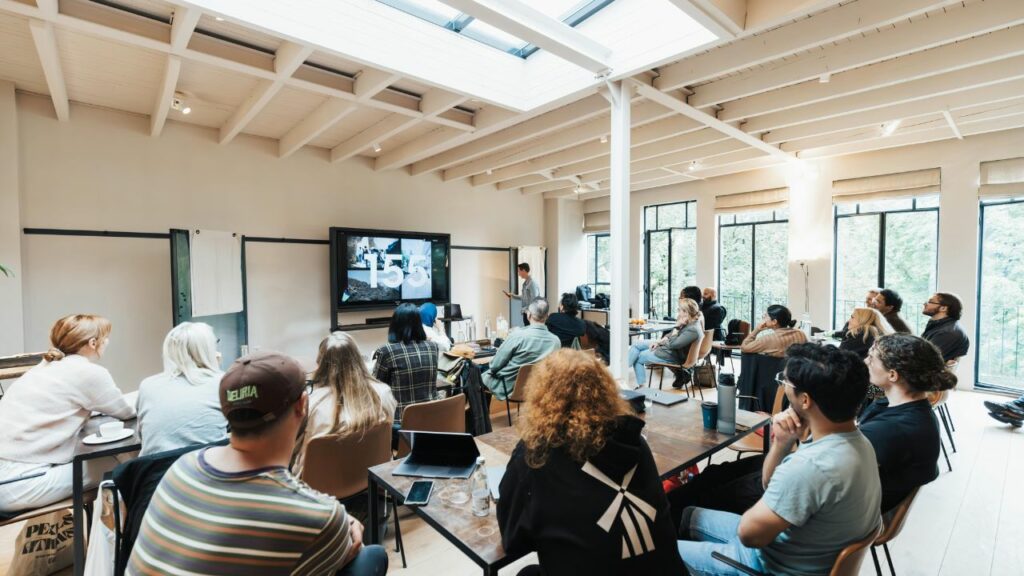Do your people believe that they can make things better? Do your people believe in your vision, their own vision and most importantly the team vision? Are your people unhappy with how things are within your organisation, that they need to change things with you? If the answer to all three questions is yes, then they are more likely to take action. If the answer to just one of those questions is no, then it is highly likely that they will not take action.
When your team don’t take action then they will not be developing themselves at the same time. We have focussed a lot on developing your team so that you can transform the culture into a highly effective leadership culture.
1. Highly Effective Leadership Culture
If you don’t develop yourself and you don’t help your team to develop themselves then the culture will not transform with your team, and it will not transform throughout your organisation either. When you come to the end of this article you should be thinking about development the most.
I think about development every day of the week, month, and year. I think about it for myself and for my people, and I want you to think about it just as much too. When it comes to culture, development is what we must think about and focus on.
A lack of development tells you that the building of momentum or movement in culture transformation has stopped. A lack of development within in your organisation will indicate the quality of people that they have and attract to work for it. Are they attracting average people, good people or great people?
DOWNLOAD MY FREE E-BOOK “LEADERSHIP OF YOURSELF”
You can tell the difference between a highly effective leader and a low performing leader through their development. You can tell the difference between a highly effective organisation and a low performing organisation through their development too.
When organisations try to transform their culture, most often it is their development that is lacking. Development is usually what is missing, so we are making it the goal here.
To develop the people within a team or an organisation, then you need a plan that you must carry out. But, before you take action on carrying out the plan, you must first develop your people.
This is when you are carrying out the transformation of culture into a highly effective leadership culture, when you are developing your people.
2. Developing Your People
It is impossible to develop your people without transforming the culture, and it is impossible to transform the culture without developing the people. It all ties in together.
Simon Sinek says, “A team isn’t a group of people who work together. A team is a group of people who trust each other.” It is impossible for a team to work well in whatever task they are doing if they don’t trust each other.
This is either in sports, the workplace or even in, and especially in the military. If a team from the military don’t trust each other, then there is no way they will go into battle to defend their country.
What is the atmosphere like on the team you lead right now? Do you trust them? Do they trust you? Do they trust each other? Do the leaders of the organisation have high trust in their people?
If there is a lack of trust among your immediate team, or between other teams within your department, then development must be on your mind.
Do you ever feel frustrated with any of your team members, other leaders, third party suppliers or even your customers? If you do feel frustrated, then development must be on your mind.
When you have shared your vision in the past or brought up change with your team, you will probably have faced or encountered a bit of resistance from them.
Even when you or another member of the team updated or improved a process, there will have been some resistance. When that happens, then development must be on your mind.
Have any of your team ever came to you feeling confused about a situation or a task they were carrying out as part of the normal day job?
When that happens, usually the leader will just advise on what to do next to try and stop the confusion. But development must be the first thing on your mind when it comes to confusion.
I have no doubt that within your role as leader of a team, you have felt stressed over this period. Some of your team members will have felt stressed at times too. So, development must be on your mind.
Between you and the team, and between the team themselves, there will have been some lack of communication. When this happens people don’t feel heard, they don’t feel cared for, and sometimes they may lose their temper because of it. Well, development must be on your mind.
We have discussed growing your organisation into the leader of your industry who attracts the most talented people that will add to the highly effective leadership culture that you are developing. Again, development must be on your mind.
3. Character Development
We have stated earlier that development is the goal, so let’s elaborate on that. When thinking of development, you must be specifically be thinking about character development and leadership development.
Character development and leadership development within yourself and within your team. When you develop your own character, you are showing your team an example so they can develop their own character too. You are not telling them what to do and how to do it.
If you don’t lead by example when developing your own character, then the low performing leaders who work alongside you will not become highly effective leaders.
If you don’t lead by example when developing your own character, then low performers within your team will not develop into high performers. If you don’t lead by example when developing your own character, then the transformation of culture into a highly effective leadership culture will stop.
To transform the culture into a highly effective leadership culture doesn’t just happen over night or by accident. A culture transformation only happens when you deliberately make it happen.
If you don’t make it happen, then it will not happen. If you don’t have development on your mind when it comes to culture, then there won’t be any.
4. Vision
The current culture within your team and organisation right now, what are your thoughts on it? Do you know who needs to develop the most within your team and why? Do you know what needs to change within your team and why?
How will the rest of the organisation benefit from the transformation of culture into a highly effective leadership culture within your team? What is the highly effective leadership vision that you have?
Do you believe in your vision for a highly effective leadership culture? Does your team believe in that same vision, and take it on for themselves?
Have you shared your highly effective leadership vision with others outside of your team and throughout your organisation? What are their thoughts?
Always remember that without trust, there will be no leadership, no increase in influence and no transformation of culture. You can have the best plans in the world, but you need your people to trust you, trust themselves and trust the plan.
I welcome hearing how this post has influenced the way you think, the way you lead, or the results you have achieved because of what you’ve learned in it. Please feel free to share your thoughts with me by commenting below.
Check out my other articles by Clicking HERE
All the best,



Hi Tom yet again a super article! Regarding the culture around leadership, and your team. I am not sure whether I am focusing too much on age, but is it a thing now that us senior workers, are being listened to, or not?
I would have thought years of experience only makes you stronger, and can offer advice, but I know we have to open up and move with the times, so any training that can be offered to fast-track team work, trust and great understanding is plus in my books!
Thanks for sharing and offering an important message!
Julia.
Hi Julia,
Thank you for sharing your insights, means the world to me.
It doesn’t matter what age you are. If you have something to say that you feel people need to listen to then it is your responsibility to share your message.
The best way for you to do that is to listen to your people first. Make them feel heard and cared for, that is how you build a relationship with them and most importantly build trust with them.
When you have that trust, your people are far more likely to listen to you and you can share what you have to say with them and do your best to gain their buy-in.
If you need any further discussion on this then get in touch with me through my website and set up a FREE Coaching Discovery Call.
All the best to you,
Tom